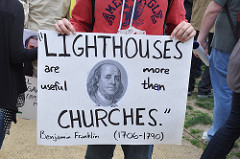Freethinkers are often defined by their rejection of religion, or at least of any organized form of religion. For example, the Freedom from Religion Foundation describes a freethinker as someone "who forms opinions about religion on the basis of reason, independently of tradition, authority, or established belief. Freethinkers include atheists, agnostics, and rationalists. No one can be a freethinker who demands conformity to a bible, creed, or messiah. To the freethinker, revelation and faith are invalid...Reason is a tool of critical thought that limits the truth of a statement according to the scientific method."
I have no issue with this as a historical definition of freethinking, but as a philosophical definition of the term I think it is problematic. First, while there are certainly many people who form their opinions about religion by irrational means, and who hold irrational religious beliefs, there are also many who "form opinions about religion on the basis of reason" and conclude that there is a God, perhaps even as this being is understood within one of the major religious traditions.
The forced dichotomy between faith and reason is a false dichotomy. Many define faith as belief without or apart from evidence, but historically and philosophically this is a flawed definition. A better definition of faith is a power to believe what you have reason to think is true, and includes the "entrusting of oneself to God".
Next, consider the statement about reason as something that is limited to the scientific method. One problem with this statement is that it is not testable by the scientific method. This is because the statement is a philosophical claim about reason and science. One cannot make claims about the nature of reason and knowledge using science alone; we need philosophy for this. In fact, there is an entire branch of philosophy devoted to the theory of knowledge: epistemology.
In order to understand knowledge and critical thought, we need to do some philosophy. There are many forms of evidence that are relevant and important: scientific, philosophical, historical, and experiential, depending on the particular question or set of questions we are exploring. We should be open to considering all forms of evidence that are relevant to our quest for knowledge in any particular realm of human inquiry.
Freethought shouldn't rule out any conclusion at the outset. Instead, we should let reality shape our views, even if we end up in perhaps unexpected places.
Photo by Jennifer Boyer, CCL

